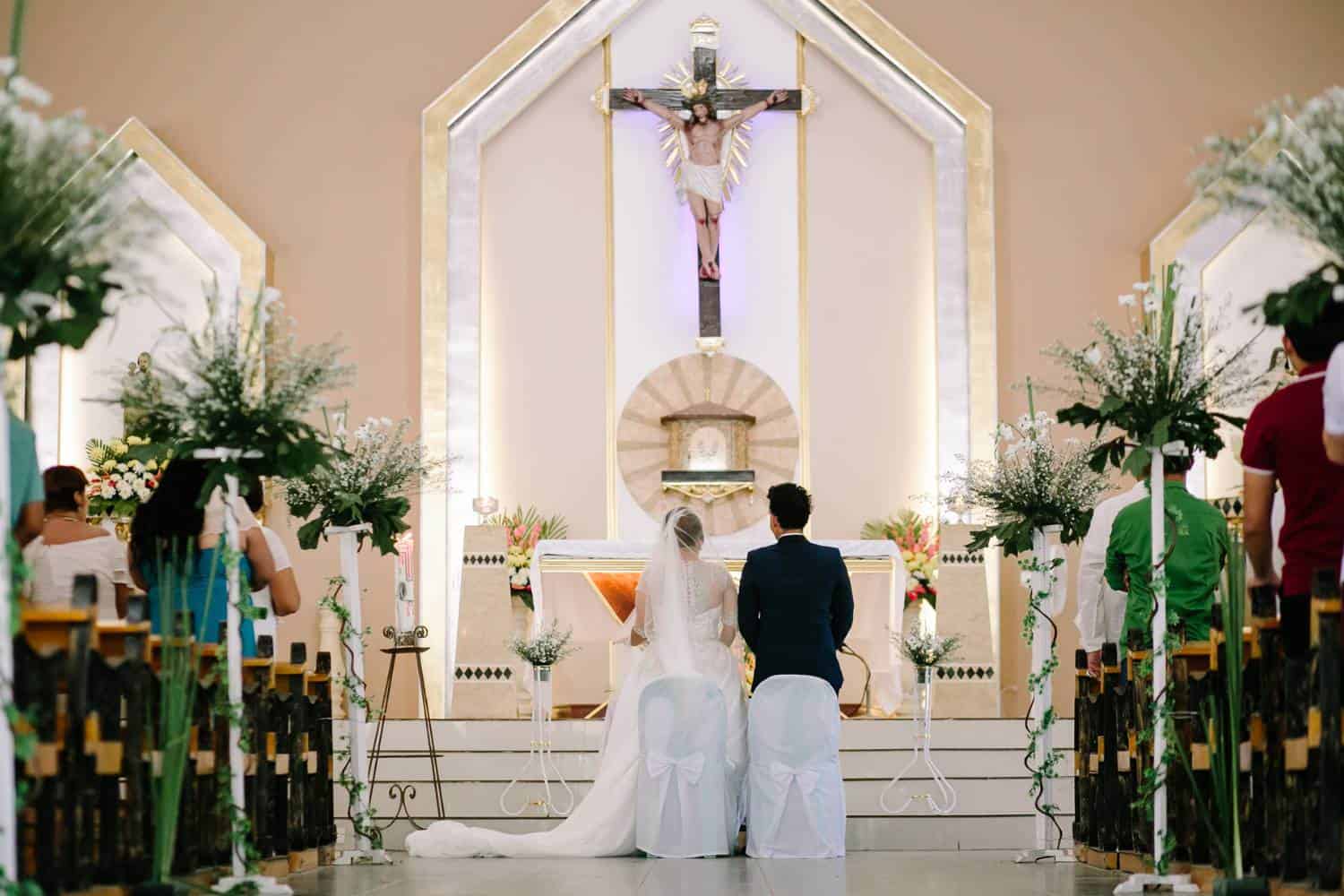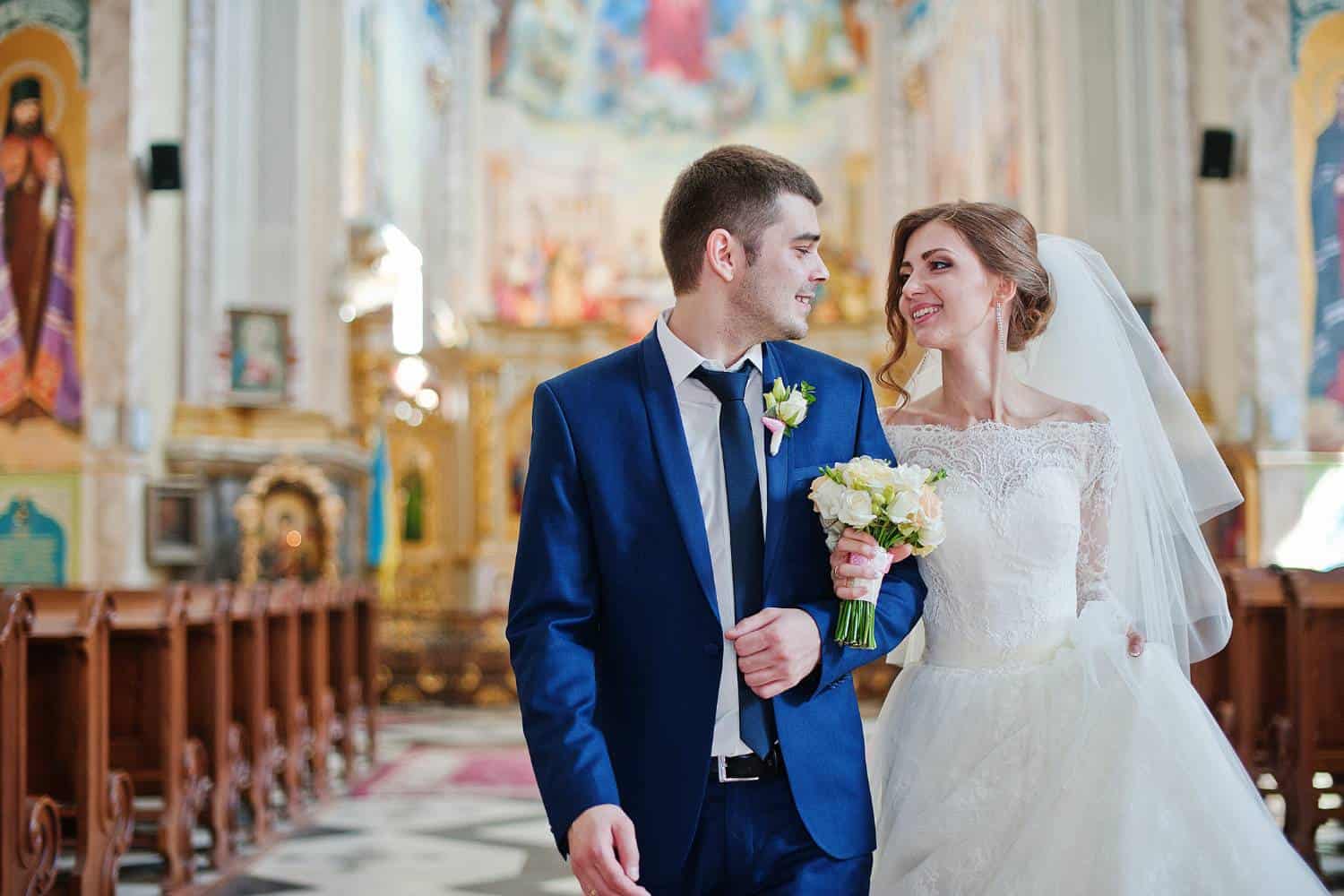Deciding on a church wedding is a personal choice, influenced by faith, tradition, and family expectations.
For some, the spiritual significance of exchanging vows in a sacred space adds meaning, offering a formal structure with prayers and blessings.
A church wedding can also honour family traditions, connecting couples to their parents’ or grandparents’ experiences.
However, church ceremonies may have limitations on music, readings, and decor, which could restrict personalisation.
For couples wanting more flexibility, non-traditional venues offer creative freedom while allowing for religious elements.
Ultimately, the decision should reflect what feels right for you as a couple, balancing tradition, faith, and personal preferences.
Let’s get straight to the point.
Deciding on a church wedding involves considering faith, tradition, and personal preferences. For couples with strong religious beliefs, a church ceremony adds spiritual significance, offering a sacred setting for vows.
Family traditions may also influence this choice, with many parents or grandparents hoping to see the next generation marry in a church.
While churches offer a beautiful, peaceful atmosphere, they often come with structured rituals and less flexibility for personalisation.
Some couples might find alternative venues—like beaches or heritage buildings—better suited to their style while still incorporating religious elements.
Costs are generally lower than other venues, but checking availability and any specific guidelines the church may have is essential.
Should I Consider A Church Wedding?
Deciding whether to have a church wedding is a significant choice for many couples. The church often holds deep meaning through faith, family traditions, or the desire for a spiritual setting.
Others may weigh factors like cost, atmosphere, and family expectations when making this decision. Here’s a detailed guide to help you decide if a church wedding is right for you.
Tradition And Spiritual Meaning
For many couples, a church wedding symbolises more than just a venue. It represents a commitment before a higher power, adding spiritual significance to the union.
For practising Christians, marrying in a church reflects shared faith and belief in divine support for their relationship.
A church ceremony often includes prayers, blessings, and religious readings, which can deepen the meaning of the vows exchanged.
If faith is an important part of your life, this setting may enhance the sacredness of the occasion.
Family And Tradition
Family expectations can influence the decision to have a church wedding.
Older generations, particularly parents or grandparents who married in the same church, might hope to see their children follow the same path.
In these cases, a church wedding can honour family traditions and demonstrate respect for their values.
However, it’s essential to balance family wishes with personal preferences. If you’re not particularly religious, it’s important to communicate this with loved ones to manage expectations and avoid conflict.
Ultimately, your wedding should reflect what feels right for you as a couple.
The Church Atmosphere
One of the major appeals of a church wedding is the atmosphere. Many churches feature beautiful architecture, stained glass windows, and a peaceful ambience, offering a serene and grand setting for your ceremony.
Churches often feel timeless, making them a fitting venue for those who appreciate traditional or historic surroundings.
This peaceful atmosphere adds a sense of solemnity to the occasion, helping to create a reflective and meaningful experience. A church could be ideal for those who love exchanging vows in a space filled with history and grace.
Formality And Structure
A church wedding typically follows a formal structure, which can provide comfort and tradition for many couples.
The ceremony often includes set elements like walking down the aisle, exchanging vows, and receiving a blessing from the officiant.
This structure leaves little room for improvisation, which some couples appreciate for its predictability and timelessness.
A church wedding offers a traditional, structured ceremony in abundance for those who enjoy this. However, the formality may feel restrictive for couples seeking a more relaxed or personalised event.
Availability And Costs
When planning a church wedding, availability is an important consideration. Churches can book up quickly, especially for popular wedding dates, so it’s wise to inquire well in advance.
Some churches also have specific requirements, such as pre-marital counselling or a minimum level of involvement in the congregation.
Church weddings tend to be more affordable compared to other venues. However, there may be fees for using the church, paying for an officiant, and sometimes for extras like musicians or a choir. It’s important to include these potential costs in your budget.
Flexibility In The Ceremony
While a church wedding offers many benefits, it can come with limitations on personalisation.
Churches often have rules about what can be included in the ceremony. For instance, some may limit the types of music, readings, or decorations allowed.
If you want a highly personalized wedding with non-traditional elements, discussing this with the officiant is important to avoid surprises. Some churches may be more flexible, but clarifying your plans early on is essential.
Religious Beliefs And Values
The role of religion in your relationship plays an important part in deciding whether a church wedding is right for you.
If faith is a significant part of your life, a church wedding may be a natural choice. It allows you to incorporate religious traditions and celebrate your union in a sacred setting.
For couples who don’t practise religion or prefer a more secular approach, it’s important to consider whether a church wedding aligns with your current lifestyle.
Some couples choose a church wedding for its tradition and family significance, while others prefer a non-religious venue that better reflects their beliefs.
Incorporating Religious Elements Without A Church Wedding
If you’re not fully committed to a church wedding but still want to include religious elements, you can do so in other settings.
Many couples invite a religious officiant to perform the ceremony in an outdoor or non-traditional venue. This allows for a blend of spiritual significance with a more flexible location.
Including prayers, blessings, or religious readings in your ceremony—whether in a garden, by the beach, or in a heritage building—can honour your faith while offering a more personalised experience.
Alternative Venues
If a church wedding doesn’t feel like the right fit, consider alternative venues that might hold personal significance.
Locations like beaches, parks, or family homes can offer a relaxed and intimate atmosphere.
Other options include heritage buildings, art galleries, or even wineries, all providing a unique backdrop for your ceremony.
These venues often allow for greater personalisation and flexibility, giving you the freedom to design a wedding that truly reflects your style.
You can still include meaningful traditions or rituals without being confined to the formalities of a church.
Discussing The Decision As A Couple
Choosing whether to have a church wedding should be a joint decision between you and your partner.
It’s essential to have open, honest conversations about your feelings, beliefs, and any concerns. Consider how religion, family traditions, and preferences align with your vision for the day.
If one partner feels more strongly about a church wedding than the other, it’s important to approach the discussion with respect and understanding.
Finding a balance—whether through a full church wedding or incorporating religious elements into another venue—can help create a ceremony that reflects both of you.
Practical Considerations
In addition to spiritual and personal factors, it’s important to consider the logistics of a church wedding.
Churches often have guidelines regarding the ceremony’s content and structure, including specific rituals or requirements, depending on the denomination.
For example, some churches may require couples to undergo pre-marriage counselling.
There may also be restrictions on decorations, music, or photography, so it’s important to clarify these with the church early in your planning process.
Understanding the church’s policies can help ensure everything runs smoothly on your wedding day.
Costs And Booking
Cost is an essential factor when planning any wedding. Church weddings are more affordable than other venues, but some churches charge for using the space, especially for larger or non-member weddings.
Active congregation members may receive reduced rates, so it’s worth checking if this applies to you.
Booking early is essential, as churches can be in high demand, particularly on weekends. Plan and be flexible if needed to ensure that your preferred date and time are available.
Flexibility And Creativity
Some couples feel that church weddings offer less flexibility compared to other venues. Strict guidelines around the ceremony’s structure, music, and readings may limit how much you can personalise the event.
However, many churches are willing to work with couples to find ways to personalise certain aspects of the ceremony.
Discuss your preferences with the officiant to see where there’s room for compromise.
Whether personalising the readings or adding a meaningful prayer, finding a balance between tradition and your personal touch is often possible.
Conclusion
Deciding whether to have a church wedding is a deeply personal decision. For some, it offers spiritual significance, tradition, and a beautiful setting for the ceremony.
For others, the formality of a church may not align with their vision for the day. The key is to weigh what feels right for you and your partner.
By considering the role of religion in your relationship, family expectations, and the atmosphere you want to create, you can make a decision that reflects your values and ensures your wedding day is truly special.
Whether you choose a church or another venue, the most important thing is that your wedding reflects the love and commitment between you.
Frequently Asked Questions
Why Is It Important to Have a Church Wedding?
Getting married in a church, in front of God, is very important. A marriage is a public declaration of love and commitment. This declaration is made in front of friends and family in a church ceremony.
Which Is More Valid Civil or Church Wedding?
Basically, a civil wedding is a legal union while a church wedding is a religious ceremony.
They’re equally legally-binding and neither one is a requirement of the other. This means you can do a church wedding even without getting married in civil rites previously.
Which Is More Important a Church Wedding or a Civil Wedding Why?
Choosing a civil wedding is ideal for a relaxed non-religious gathering, offering greater flexibility on venues too.
However, a church wedding ceremony integrates much-loved traditions in a religious context, that many feel underpins the constitution of marriage.
Is Church Wedding Considered as Civil Wedding?
While church weddings are usually set in churches with vicars, a civil ceremony is set in a non-religious setting with registrars. This doesn’t mean it’s not a proper marriage, it’s still completely legal and you have a marriage certificate and everything else. There’s just no religious involvement at all.
Do You Need Civil Wedding Before Church Wedding?
Couples who are civilly married don’t need to get married again in the church. Whether or not they want to have a more lavish church wedding is completely up to them. After all, one record of marriage is enough.



